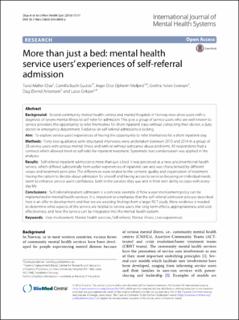More than just a bed: Mental health service users' experiences of self-referral admission
Olsø, Turid Møller; Gudde, Camilla Buch; Moljord, Inger Elise Opheim; Evensen, Gretha Helen; Antonsen, Dag Øivind; Eriksen, Lasse
Peer reviewed, Journal article
Published version

Åpne
Permanent lenke
https://hdl.handle.net/11250/2651360Utgivelsesdato
2016Metadata
Vis full innførselSamlinger
Originalversjon
International Journal of Mental Health Systems. 2016, 10:11 . 10.1186/s13033-016-0045-ySammendrag
Background
Several community mental health centres and mental hospitals in Norway now allow users with a diagnosis of severe mental illness to self-refer for admission. This give a group of service users who are well-known to service providers the opportunity to refer themselves for short inpatient stays without contacting their doctor, a duty doctor or emergency department. Evidence on self-referral admissions is lacking.
Aim
To explore service users’ experiences of having the opportunity to refer themselves for a short inpatient stay.
Methods
Forty-two qualitative semi-structured interviews were undertaken between 2010 and 2014 in a group of 28 service users with serious mental illness and with or without substance abuse problems. All respondents had a contract which allowed them to self-refer for inpatient treatment. Systematic text condensation was applied in the analyses.
Results
Self-referral inpatient admission is more than just a bed. It was perceived as a new, unconventional health service, which differed substantially from earlier experiences of inpatient care and was characterised by different values and treatment principles. The differences were related to the content, quality and organisation of treatment. Having the option to decide about admission for oneself and having access to services focusing on individual needs seem to enhance service users’ confidence, both in the services they use and in their own ability to cope with everyday life.
Conclusions
Self-referral inpatient admission is a concrete example of how a user involvement policy can be implemented in mental health services. It is important to emphasise that the self-referral admission process described here is an offer in development and that we are awaiting findings from a larger RCT study. More evidence is needed to determine what aspects of the service are helpful to service users, the long-term effects, appropriateness and cost-effectiveness, and how the service can be integrated into the mental health system.
